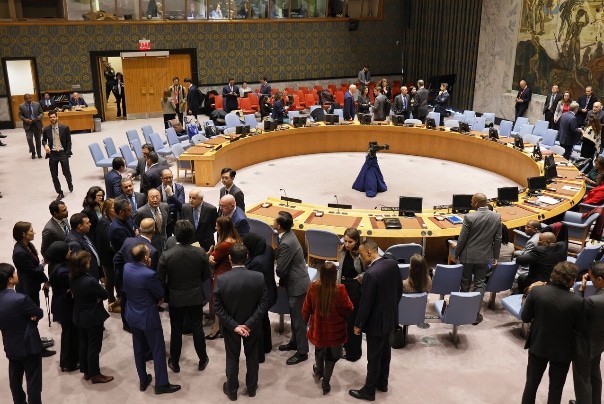The “Aid to Gaza” resolution was approved with abstentions from America and Russia; What does the Security Council resolution say?
This resolution received 13 positive votes out of 15 votes of the Security Council members in the public session of the Security Council on Friday, and the United States and Russia, as two permanent members with veto power in this Council, abstained from this resolution. In this way, this resolution was approved without any dissenting vote.
The United Nations Security Council on Friday, January 1, 1402, in its voting session, following the veto of the modified Russian resolution, approved this resolution from the American point of view and to expand the amount of aid to the residents of Gaza.
There is no temporary ceasefire; What resolution did the Security Council approve?
The United States has announced that it supports the latest draft of the Security Council resolution on Gaza. In this resolution, the request for a “temporary ceasefire” has been refused. The adopted Security Council resolution calls on all parties to facilitate and enable the “immediate, safe, and unimpeded delivery of humanitarian aid in bulk” directly to Palestinian civilians and allows Israel to control the delivery of aid to Gaza.
The resolution also calls on the parties to “create conditions for a lasting cessation of hostilities.” The first version called for an end to the war, while the second called for a “suspension” of the war to provide aid.
The resolution also calls on the parties to facilitate “the use of all available routes across the Gaza Strip” to send aid. The resolution also called on the UN Secretary-General to appoint an authority to oversee the delivery of aid and to establish a UN mechanism to expedite aid. This represents another difference from the original text. The initial draft requested the UN Secretary-General to establish a binding mechanism for rapid aid.
The adopted Security Council resolution also calls for the release of the “hostages” and the entry of sufficient fuel into Gaza to meet humanitarian needs.
In other words, from the point of view of international analysts, it can be said that in the public meeting of the Security Council on Friday, the United States vetoed any suspension or immediate ceasefire, and a resolution was passed in the Security Council, allowing the Israeli regime to continue. He gives his attacks without fear of international punishment.
UN Secretary-General: Israel’s military operation is preventing the distribution of aid in Gaza
Following the approval of the UN Security Council resolution to send emergency aid to the Gaza Strip without the approval of an immediate ceasefire, UN Secretary General Antonio Guterres announced: that Israel’s military operation is preventing the distribution of aid in Gaza.
In his latest press conference with reporters at the UN headquarters in New York, the UN Secretary-General said that it is wrong to judge the effectiveness of humanitarian aid operations in Gaza based on the number of trucks entering Gaza.
“The real problem is Israel’s military methods, which create huge obstacles to the distribution of humanitarian aid inside Gaza,” he said.
The UN Secretary-General continued: Effective relief operations in Gaza require the security of UN forces to be able to work in a safe environment, to have logistical capacity, and to resume commercial activities. These four elements do not exist.
Guterres also asked Israel to remove obstacles to the distribution of aid. We haven’t seen any support for civilians in Gaza for weeks.
America and Israel are at odds over the cease-fire in Gaza
Diplomatic sources told “Nada Al-Watan” that there are clear differences between the US and Israel regarding the implementation of a ceasefire in southern Gaza because the Americans are considering the proposal of a ceasefire on the southern border and then the pressure to implement Resolution 1701, in parallel with the negotiations to determine the borders. but Israel insists on implementing amendments to the resolution that would move this regime to the seventh chapter.
These sources explained by referring to Iran’s position as a country whose allies are present from Gaza to Yemen; Iran has no intention to get involved or go to war.
Emphasizing the importance of Hezbollah’s position for Iran and the country’s efforts to protect and support it, the mentioned sources added: Tehran believes that Hezbollah did not play a role in the beginning of the Al-Aqsa storm battle, but paid a high price to achieve the right results in this battle.
The representative of Palestine demanded an immediate ceasefire and no forced displacement of Palestinians
After the UN Security Council agreed to send emergency aid to the Gaza Strip after only one week, and there is no mention of an “immediate ceasefire” to prevent the US from vetoing the resolution, the representative of Palestine in the UN called for an immediate ceasefire. It was in Gaza.
The reaction of Israel’s representative in the United Nations to the Security Council resolution
While rejecting the Security Council resolution, Gilad Erdan, the representative of the Zionist regime in the United Nations, claimed that the United Nations’ focus on aid mechanisms for Gaza is unnecessary and far from reality.
Hamas’ reaction to the Security Council resolution
The Islamic resistance movement Hamas emphasized that the resolution approved by the Security Council regarding the expansion of aid to Gaza is an insufficient measure and does not correspond to the needs and demands of the current catastrophic situation in this area.
The movement added that the US government stripped this resolution of its essence and presented it in a way that allowed the occupiers to continue killing and destroying.
Hamas stated that the Security Council should oblige the Zionist occupation regime to send sufficient aid to the entire Gaza Strip, especially the northern areas.
England: The people of Gaza urgently need food, medicine, and shelter; Emphasis on a lasting ceasefire
British Foreign Minister referring to the humanitarian crisis in Gaza and the urgent need of the people of this region for food, medicine, etc

